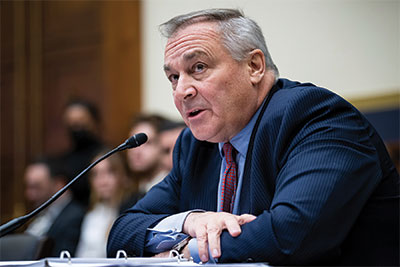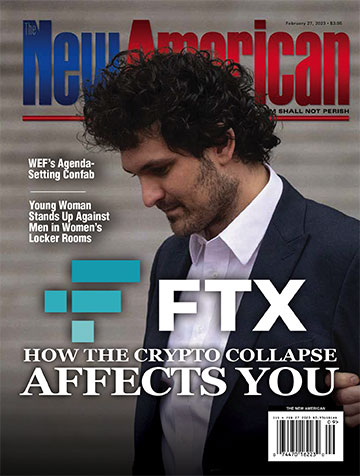How the Crypto Collapse Affects You
People are understandably furious that federal authorities released disgraced crypto-mogul Sam Bankman-Fried (SBF) to house arrest at his parents’ multimillion-dollar mansion in California. The FTX founder stands accused of squandering billions in customer funds and using his cryptocurrency trading empire as a slush fund for leftist campaigns.
Some believe the now-bankrupt company may have even served as a conduit for $60 billion in U.S. tax money — supposedly intended for Ukraine’s war effort — to land back in Democratic political coffers. Others say SBF has set up the crypto industry for government regulatory crackdown and establishment of a central bank digital currency (CBDC), which globalist leaders admit will establish totalitarian control over every dollar you earn, save, and spend.
Yet SBF awaits trial in the lap of luxury, and even though his parents are Stanford University law professors who would likely be inclined to advise discretion in the face of 12 federal charges related to misappropriating billions of dollars in customer funds, the 30-year-old former billionaire hasn’t stopped singing since the collapse of his cryptocurrency exchange in early November.
Prior to his tardy December 12 arrest in the Bahamas and subsequent extradition to the United States, he granted several headlining interviews and posted dozens of tweets, consistently claiming innocence and insisting that his company could have survived if untrustworthy advisors had not “forced” him to declare bankruptcy.
In all these public conversations, little if anything was mentioned about his dubious ties to the Democratic Party. He was the second-largest donor to Biden’s 2020 campaign (after Michael Bloomberg), and again to liberal campaigns and causes leading up to the 2022 midterms. Only George Soros outstripped him in those elections. He had promised even more leftist support to come in 2024 — as much as $1 billion, according to Fortune magazine.
Congress would have had the opportunity to question SBF further, but Bahamian authorities arrested him, at the request of the U.S. government, the night before he was scheduled to testify via video conference for the House Financial Services Committee. The arrest saved him the congressional grilling that many hoped GOP legislators would mete out. The sting of missed opportunity was amplified shortly afterward, when two other top FTX execs — company co-founder Gary Wang and former trading firm CEO Caroline Ellison — pleaded guilty to several federal wire-fraud and conspiracy charges. They are now reported to be cooperating with federal prosecutors.

Family ties: Barbara Fried, mother of FTX founder Sam Bankman-Fried, and her husband signed a $250 million bond, agreeing to keep their son at their California home until his trial in October. (AP Images)
Undaunted, SBF is back to promoting his public self-exoneration campaign. Just days after he pleaded not guilty to all charges in U.S. District Court in New York City, he launched a Substack blog on January 12, apparently intending it as a tell-all. His premiere post, “FTX Pre-Mortem Overview,” is merely a rehash of earlier claims, but ends with the promise, “I have a lot more to say.”
So do federal agencies — namely the U.S. Justice Department, the Securities and Exchange Commission (SEC), and the Commodity Futures Trading Commission (CFTC). The agencies’ mix of civil and criminal charges includes securities fraud, wire fraud, conspiracy to commit money laundering, conspiracy to misuse customer funds, and campaign-finance violations.
For now, SBF has plenty of blogging time, since his trial begins October 2. If convicted, he could face up to 115 years in prison.
Crime and Punishment
However, many see his heretofore kid-glove handling as prelude of what is to come. “We are dealing with ‘A punishment does not fit the crime’ scenario and a system that by default favors those with money and disproportionately punishes those without,” wrote crypto expert Erin Gambrel in a statement to Newsweek. “Crime DOES pay if you start with a big enough bank account.”
She has a point, for even though SBF saw his personal fortune, estimated at some $16 billion, vanish overnight, he boasts a wealth of family and political connections. His mother, Barbara Fried, is founder and president of Mind the Gap, a “left-wing super PAC dedicated to helping Democratic political candidates win elections,” reports Influence Watch. Its major donors include the co-founders of Facebook and LinkedIn, former Google CEO Eric Schmidt, and James Rubin, former U.S. assistant secretary of state for public affairs under President Bill Clinton.
Barbara’s sister, Dr. Linda Fried, is a member of the World Economic Forum’s (WEF) Global Agenda Council on Ageing and dean of Columbia University’s Mailman School of Public Health. (Until recently, WEF listed FTX as a partner on its website.)
SBF’s trading fund CEO, Caroline Ellison, provides another compromising connection. Her father, Glenn Ellison, heads the Massachusetts Institute of Technology’s (MIT) School of Economics and was once boss to Gary Gensler, current chair of the SEC, one of the agencies presently prosecuting SBF. It’s the same agency that the former billionaire had been actively pushing to shackle the crypto industry with an enhanced regulatory framework.
In that campaigning he cozied up with lawmakers such as Maxine Waters (D-Calif.), who until recently chaired the House Financial Services Committee and now, as ranking member, helps lead the bipartisan congressional FTX investigation. Since November, Twitter has been aflutter with photos picturing the smiling faces of Waters and SBF side by side, and a video of the congresswoman apparently blowing a kiss to SBF after he testified before her committee in 2021. How did he rise so far, so fast?
From Obscurity to Financial Fame
SBF graduated from MIT in 2014 with a bachelor’s degree in physics and began work as a quantitative trader for Jane Street Capital. Seven years later, he was “a billionaire 16 times over” who had “one of the fastest accumulations of self-made wealth in history,” according to Nicholas Pongratz of BeInCrypto. Forbes named him among its 2021 “30 Under 30” in North American finance, and CNBC’s Jim Cramer called SBF “the J.P. Morgan of this generation.”
What catapulted him to financial celebrity? The simple answer is arbitrage, or buying in one market and selling at a higher price in another market.
By late 2017 he had quit Jane Street and launched a cryptocurrency trading firm, Alameda Research, which specialized in buying and selling Bitcoin and other digital tokens. At the time, Bitcoin was selling for around $10,000 in the States, while it traded for 10 percent more than that in Japan and 30 percent more in Korea. Taking advantage of the price difference was tedious work, “but it was doable,” SBF told Pongratz, “and you could scale it, making literally 10% per weekday, which is just absolutely insane.”
The “hard part” was convincing banks in various countries to gamble on his enterprise so he could handle all the trades. So, he chose a company name that would hide his crypto focus. The deceit lay not in “Alameda” — his hometown near San Francisco — but in the word “Research.”
“If you named your company, like, ‘we do cryptocurrency, Bitcoin, arbitrage, multinational stuff,’ no one’s going to give you a bank account,” SBF told Real Vision podcast host Ash Bennington in June 2021. “But everyone wants to serve a research institute.”
Alameda’s success prompted SBF to launch his own cryptocurrency exchange in 2019. FTX is short for “Futures Exchange,” and it was a forum where users could buy and sell digital currency. FTX also launched its own cryptocurrency coin — called FTT (short for FTX Token) — which is equivalent to printing money out of thin air but common practice for companies in the crypto world. Tokens have value as long as there is market demand for them. (Bitcoin is different, as we’ll see.)
Riding a bull market for crypto, FTX reached an $18 billion valuation by July 2021, with huge investors such as Softbank, Sequoia Capital, and leftist financial behemoth BlackRock. The company billed itself as the “most trusted way to buy & sell crypto” in advertisements featuring celebrities such as Larry David and Tom Brady. It also landed a 19-year, $135 million naming-rights contract for the Miami Heat basketball stadium in Florida. Digital currency news outlet Decrypt reported that SBF bragged at the time, “We don’t need the other 18 years to have the funds,” giving the impression that the company was riding high.
Altruism or Avarice?
FTX advanced to become the world’s third-largest cryptocurrency exchange by volume, achieving a $32 billion valuation at its height. Amid this success, SBF pushed “effective altruism,” a philanthropic movement whose followers pursue wealth in order to donate it to charitable causes. He had worked briefly for the Centre for Effective Altruism (CEA) prior to launching Alameda Research, and it was CEA head Tara Mac Aulay who co-founded the trading firm with him. (After the FTX collapse, she tweeted that she and several others resigned from Alameda in 2018 “in part due to concerns over risk management and business ethics.”)
His alleged philanthropy evinced itself in tens of millions of dollars’ worth of donations to liberal causes. Hence the kiss from Waters, pundits surmise.
But it is not just FTX investors who may have lost their shirts to SBF’s supposed altruism. Last March, CoinDesk reported that FTX partnered with Ukraine to launch a crypto-donation website for that country’s war effort. The announcement came within days of President Joe Biden’s pledge of American taxpayer dollars to Ukraine, which as of November amounted to $60 billion. After FTX filed for bankruptcy protection, rumors circulated about a vast money-laundering operation: Biden funneled U.S. aid to the invaded nation, which invested in FTX, which then made massive donations to U.S. Democrats, all courtesy of the American taxpayer.
The Covid Connection
SBF also used his supposed wealth to set himself up as the poster child for pandemic preparedness. In 2020 he launched the nonprofit Guarding Against Pandemics (GAP), “to support legislation that increases government investment in pandemic prevention plans,” according to Influence Watch. GAP endorses the Biden administration’s proposal of $30 billion in federal funding to contain future outbreaks. The group’s website calls for development of advanced vaccines and therapies, improved masks, more effective testing, and pandemic-proof buildings. In other words, GAP supports everything about the government’s policies that wrecked the economy, ruined lives, and eroded liberty.
SBF installed his brother, Gabe Bankman-Fried, as GAP director. Interestingly, Gabe had previously worked for two years as a legislative correspondent on the House Financial Services Committee. His résumé also includes a six-month stint as a data consultant for Civis Analytics, a firm that supports Democratic causes.
Among GAP’s first ventures was a $150,000 advertising campaign pushing Democratic lawmakers to back federal pandemic funding. From that modest beginning the PAC’s donations skyrocketed. The “brothers and their network have spent at least $70 million since October 2021 on research projects, campaign donations and other initiatives intended to improve biosecurity and prevent the next pandemic,” The Washington Post reported in November.
Under SBF’s leadership, FTX also funded the Brazilian TOGETHER Trial, which launched in 2020 and quickly concluded that ivermectin is not effective against the virus that causes Covid-19. Ignoring nearly 90 percent of other clinical trials that demonstrated the benefits of ivermectin for Covid patients, bureaucrats and major media still quote the flawed study in their promotion of the Covid jab.
In a review of the raw data, Charles Hooper and David Henderson of the Cato Institute pointed out that ivermectin “actually did benefit the Brazilians in the treatment group.” They also warned of glaring conflicts of interest, in that “some of the researchers involved in the TOGETHER trial had performed paid services for Pfizer, Merck, Regeneron, and AstraZeneca, all companies involved in developing COVID-19 therapeutics and vaccines.”
The Downfall
The year 2022 evinced results of Biden’s “Build Back Better” regime, and crypto was not immune. Investors described the tough bear market as a “crypto winter.” By summer the market had lost $2 trillion in value from its high in 2021, according to CNBC. Collapses of various tokens triggered bankruptcies among lenders, but FTX emerged as a savior, bailing out two of the largest and earning a reputation as a rock in the tumultuous market.
Its glory was short-lived. FTX had issued many counterfeit tokens to artificially prop up its own market value and appear more liquid, a practice discovered during investigations by its top competitor, Binance, in anticipation of a merger with FTX. When Binance backed out of the deal, investors got nervous and caused a run on FTX, which was then forced to admit its lack of funds.
Its $32 billion suddenly vanished into thin air, and its crash swamped the industry. Decrypt reported that overnight the entire crypto market lost billions, dropping below $1 trillion in value. Others such as BlockFi and Genesis followed with bankruptcy filings, citing crippling ties to the failed giant.
Within days investors filed a class-action lawsuit against SBF and his cohorts, including celebrity promoters such as David and Brady. The plaintiffs’ team of attorneys includes two high-profile lawyers who successfully led the U.S. government’s antitrust case against Microsoft in 2001.
SBF resigned on November 11, the same day that FTX and its affiliates, including Alameda Research, declared bankruptcy. John J. Ray stepped in as the company’s new CEO. Ray is famous for overseeing the Enron bankruptcy proceedings in 2001 and has 40 years’ experience cleaning up corporate collapses.
In his bankruptcy court filing issued November 17, Ray called the FTX debacle “unprecedented” and wrote, “Never in my career have I seen such a complete failure of corporate controls and such a complete absence of trustworthy financial information as occurred here.” At the time, he could not determine how much money the company had or how many people it employed. The bankruptcy filing estimated that FTX US and Alameda Research each carried $10 billion to $50 billion in liabilities.
Picking up the pieces: FTX Group CEO John J. Ray testifies during a December House Financial Services Committee hearing on the FTX collapse, calling it “unprecedented” in his 40-plus years’ experience. (AP Images)

How could this be true, considering that the FTX website claimed that the company had “successfully undergone a US GAAP [generally accepted accounting principles] financial audit for 2021”? CoinDesk further reports that the “2020 and 2021 FTX US audits were performed by New York City-based Armanino,” while the company’s international arm, FTX Trading LLC, “worked with auditing firm Prager Metis.”
It turns out these outfits are anything but transparent. The Deep Dive reveals that neither Prager Metis (a private firm that claims more than 100 partners and principals) nor Armanino (which bills itself as a top-25 U.S. accounting and consulting firm) identifies any of its clients publicly. However, both companies’ oversight failure allowed FTX to release financial documents as recently as last summer that showed a robust $1.2 billion in 2021 revenues and $2.5 billion in cash as of the end of that year.
Ray’s testimony belies those financials. On December 13 he revealed to the House Financial Services Committee that FTX had no accounting department and used QuickBooks to track its multibillion-dollar portfolio. He also confirmed that FTX had spent billions from customers’ accounts without their permission and had created a $65 billion line of credit from FTX to Alameda. “This is really just old-fashioned embezzlement. This is just taking money from customers and using it for your own purpose,” he told legislators.
“We know what Alameda did with the money,” said bankruptcy attorney Adam Landis in a January hearing. “It bought planes, houses, threw parties, made political donations. It made personal loans to its founders. It sponsored the FTX Arena in Miami, a Formula One team, the League of Legends, Coachella, and many other businesses, events and personalities.”
Damian Williams, U.S. attorney for New York’s Southern District, arrived at the same conclusions. At a December 13 press conference, he accused SBF of “one of the biggest financial frauds in U.S. history” and zeroed in on campaign-finance violations. Williams said SBF made “tens of millions of dollars in illegal campaign contributions” that were “disguised to look like they were coming from wealthy co-conspirators, when in fact, the contributions were funded by Alameda Research with stolen customer money.” He went on to postulate that “all of this dirty money was used in service of Bankman-Fried’s desire to buy bi-partisan influence and impact the direction of public policy in Washington.” Williams said that investigators hope to recoup some of the money SBF donated to campaigns to restore it to its rightful owners.
Search and Rescue
As of mid-January, Decrypt reported, bankruptcy attorneys had “clawed back $5B in lost assets” of “more than 9 million customer accounts linked to roughly $120 billion associated transactions.” And if the phrase “clawed back” seems incongruous when referring to billions, consider that Ray also told The Wall Street Journal that he is even “looking into the possibility of reviving the bankrupt crypto exchange” if that would recover more value for customers than simply liquidating assets or selling the platform.
But will other traceable funds be recouped? Apparently not in all cases. For example, after the bankruptcy judge terminated FTX’s naming-rights agreement for the Miami Heat arena, the county issued a report explaining that, of the $20 million FTX already paid under the contract, it has already spent a large amount on gun-violence-prevention initiatives. Jones Walker legal analyst David Weinstein told investigative journalist Christina Vazquez that if the court determines that Miami-Dade County made the contract in good faith, there will likely be no obligation for payback. The same goes for “contributions made to political campaigns,” he explained, “where that money has already been spent, and that money is never going to be returned.”
The “good faith” argument may be a hard sell in the case of politicians; the federal government had been warned of fraud last May in testimony from Terry Duffy, chairman and CEO of the futures company CME Group. He appeared before the U.S. House Agriculture Committee and blew the whistle on FTX’s bankrupt business scheme. Legislators refused to listen. “I got berated,” he recalled in a CNBC interview after FTX declared bankruptcy.
Why the congressional stonewalling? “It appears FTX founder Sam Bankman-Fried and his family had no shortage of influence within the Democrat Party,” U.S. Representative Barry Loudermilk (R-Ga.) told The Daily Signal. Loudermilk, who serves on the Financial Services Committee, added that such influence “could amount to conflicts of interest, especially if individuals within the Democrat Party accepted money with knowledge of potential criminal activity occurring at FTX.”
Loudermilk noted oddities that he said must be thoroughly investigated. “What did the SEC know and when did they know it?” he asked. “And is it a coincidence, given FTX’s involvement in the Democrat Party, that they filed for bankruptcy only days after the 2022 midterm elections?”
Meanwhile, some members of Congress have already promised to forward donations they received from SBF to charity, though how that helps restore investors’ money is not explained. Regardless, what they consider worthy causes would likely meet with SBF’s approval. Representative Maxwell Frost (D-Fla.), for example, tweeted that he would send SBF’s contribution to the Zebra Coalition, an LGBTQ+ youth outreach.
And while the Democratic National Committee and both the Democratic Senatorial and Congressional Campaign Committees have promised to return contributions made by SBF since 2020, there is no word yet about what President Joe Biden intends to do with donations he received.
Never Let a Crisis Go to Waste
Instead, his administration is calling for tighter regulation of crypto. In a statement released November 16, Treasury Secretary Janet Yellen called for “more effective oversight of cryptocurrency markets” despite admitting the “very strong investor and consumer protection laws” that already exist.
SBF’s friend, Maxine Waters, agrees. “We need legislative action to ensure that digital assets entities cannot operate in the shadows outside of robust federal oversight and clear rules of the road,” she declared in a Financial Services Committee press release.
No wonder industry insiders postulate that the FTX crash was planned to bring down crypto, or at least crush it under regulatory burden. They see the real target as Bitcoin, the first alternative currency, originally released in January 2009. Bitcoin is unique because it is entirely decentralized, as explained by Dr. Steve Turley of Eastern University on his TurleyTalks blog. No single institution issues Bitcoin, and its value is independent of any central bank or government. It uses open-source, peer-to-peer technology with no central servers or storage. Its ledger is public, and coding strictures and encryption not only prevent counterfeiting but also ensure a limited supply. No more than 21 million Bitcoins will ever be minted. Its independence helps explain why Academy Securities strategist Peter Tchir told Markets Insider that Bitcoin “has remained surprisingly resilient” despite the FTX collapse.

FTX no more: A bankruptcy judge terminated FTX’s naming rights for the Miami Heat basketball arena, though experts predict that investors will never recover the $20 million FTX already paid under contract. (AP Images)
In other words, government can’t control it, so Bitcoin stands in the way of plans to replace the dollar and link our money to a social-credit system that tracks every dollar earned, saved, and spent.
The demise of FTX “guarantees a government crypto crackdown,” tweeted Robby Starbuck, who campaigned unsuccessfully in 2022 as a Republican for the U.S. House in Tennessee. The federal government will “use this as an excuse to advance their own digital currency to upend crypto. They’ll sell the government-backed digital currency by saying it will protect you,” he predicts.
“I’m convinced the eventual endgame with [CBDC] is to tie a social credit system to it so you can’t spend money if you’ve said or done anything that the ruling class finds offensive,” Starbuck continued. “Sam will have helped create that reality,” with FTX.
Starbuck cited the social-credit systems already employed by oppressive regimes such as China’s, which has been rating citizens since 2014. Those who misbehave — according to the government’s definition of that word — are penalized in various ways, such as high utility rates, impeded access to public services, and restrictions on travel or education.
The same is planned for the United States by an establishment that has been openly plotting to implement a cashless society to control humanity. The United Nations’ “Better than Cash Alliance” — founded in 2012 and funded by leftist organizations such as the Ford Foundation and the Bill & Melinda Gates Foundation — admits on its website that the aim is to “transition from cash to responsible digital payments to help achieve the Sustainable Development Goals” of Agenda 2030.
That document is the latest iteration of Agenda 21, a plan unveiled at the UN 1992 Rio Earth Summit. It promises government control over not just the environment, but every area of life: education, employment, housing, property ownership, transportation, communications, energy, healthcare, etc. UN officials dub it a comprehensive blueprint for the reorganization of human society. And what better way to achieve that than by digital control of your finances?
Reuters reports that dozens of countries worldwide are developing CBDCs, and places such as Greece, Israel, and Qatar have already placed thresholds on cash transactions.
Here in the United States, none other than Maxine Waters tried twice to link 2020 Covid stimulus payments to digital-dollar wallets. The language she proposed ended up being stripped from the final bills, but Forbes stated the obvious: “This signals the U.S. is serious in establishing infrastructure for a central bank digital currency.”
Those who consider this an innocuous proposal need look no further than Agustín Carstens, general manager of the Bank of International Settlements (BIS), which is headquartered in Switzerland but operates beyond the jurisdiction of any government. In October 2020, he explained that CBDCs are about surveillance and manipulation. “The central bank will have absolute control on the rules and responsibilities that will determine the use” of digital currency, he said in a BIS video. “Also, we will have the technology to enforce that.”
Earlier in 2020 he had announced a two-year plan to develop CBDCs with central banks in Canada, England, Europe, and Scandinavia, and the Federal Reserve System in New York. On cue, Biden issued an executive order last March pledging development of a U.S. CBDC.
Then, in September, the White House published “Technical Evaluation for a U.S. Central Bank Digital Currency System,” which specified the administration’s plans. The 21 federal agencies involved in its authorship indicate the breadth of its impact — these include the Departments of Commerce, Defense, Energy, Homeland Security, Justice, Labor, State, and Transportation, and the Environmental Protection Agency. The document declares that the CBDC will advance “racial equality,” “minimize energy use,” and promote “U.S. environmental policies.” Get ready to toe the party line if you hope to use your future digital wallet.
One month after that White House publication came out, the BIS announced that it had successfully completed its pilot program on CBDC cross-border payments. The next month witnessed the FTX collapse, and within days, Reuters reported that New York’s Federal Reserve Bank was starting a 12-week “digital dollar pilot” program with nine global banking giants — including Citigroup, Mastercard, and Wells Fargo.
How this story ends will depend on whether Americans allow globalist insiders to use crises such as the FTX collapse to impose financial tyranny. As usual, we cannot trust major media, which focus solely on SBF’s criminal charges, support his Covid propaganda, scoff at the Ukraine connection, and remain silent about the semi-hidden CBDC agenda. It’s up to taxpayers interested in self-preservation to educate themselves and their elected officials about what this war on cash means to the future of individual liberty and national sovereignty.
Could FTX Fail Portend a Broader Economic Crash?
Industry experts say the international crypto community will feel the effects of the FTX collapse for years to come. There is also risk to the broader economy as illustrated in the relation of FTX to Hong Kong-based Tether, a company that markets a crypto token by the same name.
Known as a “stablecoin” because it is intended to maintain a consistent price rather than fluctuate based on demand as other cryptocurrencies do, the Tether is equal to one U.S. dollar and is currently the most popular stablecoin.
In 2021, crypto news site Protos reported that it was the only stablecoin that FTX used. In fact, Sam Bankman-Fried (SBF) founded FTX on May 8, 2019, the same day that Tether launched a $1 billion fundraiser. Additionally, FTX trading firm Alameda Research was one of two companies “responsible for seeping roughly two-thirds of all Tether into the crypto ecosystem,” to the tune of tens of billions of dollars.
After FTX and Alameda declared bankruptcy in November, Tether announced that the collapse presented no risk to its token. However, Revolver reported that Tether could be “FTX on Steroids,” as there is no proof that the stablecoin is backed by dollars. “Tether has never been audited in any way,” despite having been launched in 2014. In fact, regulatory authorities have fined Tether nearly $60 million in recent years for misrepresenting its reserves.
If the parent company “is pumping out new Tethers without actually taking in an equal amount of USD [U.S. dollars], then it is essentially a privately-run money printer,” states Revolver. “Just manufacture new Tethers, pump them into a crypto exchange, use them to buy bitcoin, then sell the bitcoin for real U.S. dollars.”
It’s interesting conjecture, considering that the company was founded by venture capitalist Brock Pierce, a former child actor with connections to Jeffrey Epstein. In 2019, Crowdfund Insider described his crypto business model as “Just Print More Cash.” Though Pierce is no longer affiliated with Tether, Revolver calls the company’s current CEO and CFO “serial scammers.”
Curiously, Tether seems to maintain itself in good graces with federal authorities. The Washington Post complained last August that the U.S. government had taken no action against the company for defying U.S. sanctions on Tornado Cash, a crypto service that allows users to launder money and hide stolen assets.
Revolver also points out that Tether is the “crypto of choice” for everything from drug cartels “deeply intertwined with U.S. three-letter agencies” to “U.S. government-backed rebels in Myanmar” to “al-Qaeda affiliated Sunni rebel groups” in Syria. “Remember the infamous WikiLeaks-released email in which Hillary Clinton acknowledged Al-Qaeda is on our side in Syria?” the article asks. “If only there were a mechanism to quietly launder money to these U.S. backed groups with deniability!”
Indeed, Bloomberg noted in 2021 that Tether presents an easy vehicle for money laundering, and following the Russian invasion of Ukraine, demand for Tether skyrocketed on the Ukrainian Crypto Exchange, CoinDesk reported.
Could its close relationship with Alameda have also formed a money-laundering conduit for leftist causes that were recipients of SBF’s philanthropy? He was, after all, a record-breaking donor to both Joe Biden and countless liberal campaigns.
Moreover, is Tether truly as “stable” as it bills itself? Economist Eswar Prasad warned CNBC in January that a run on stablecoins could upend the “very fragile” bond market. “Tether says that more than 58% of its reserves are held in U.S. Treasury Bills, accounting for around $39.7 billion.” A liquidity crisis would force it to redeem those holdings, creating turmoil in the U.S. economy. Considering plans for a central bank digital currency, perhaps that is what regulators are after.


